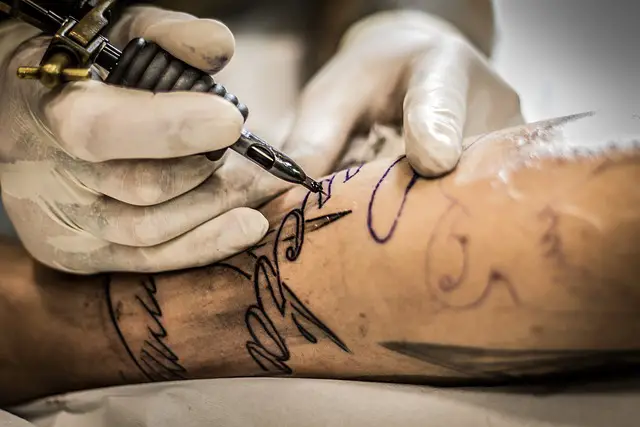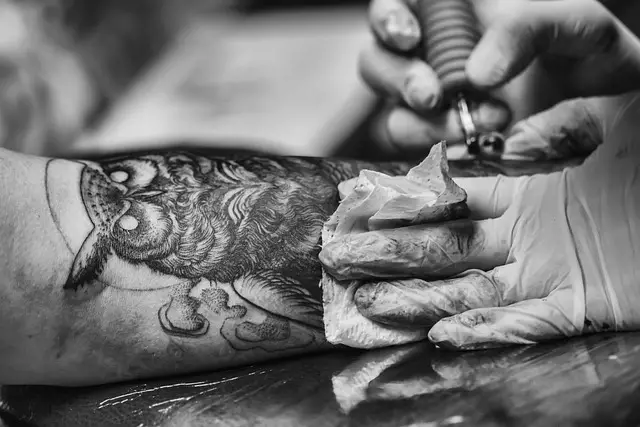Why Should You Not Get A Tattoo? Tattoos have emerged as a widely popular form of art and self-expression, adorning the bodies of countless individuals across different cultures and societies. As these intricate designs permanently etch personal stories onto the skin, the significance of thoughtful decision-making cannot be overstated. While tattoos can be incredibly meaningful and empowering, it is essential to approach the process with caution and deliberation.
The purpose of this article is to provide readers with a comprehensive guide to identifying situations when getting a tattoo may not be advisable. By exploring potential pitfalls and pitfalls, we aim to equip individuals with the knowledge needed to make informed choices before taking the indelible leap into the world of tattooing. From impulsive decisions to health considerations and their impact on professional life, this article will shed light on crucial factors to consider before permanently adorning your skin with art.
Contents
Impulsive Decisions: Think Before You Ink
The allure of spontaneous decisions can be intoxicating, especially when it comes to getting a tattoo. The thrill of stepping into a tattoo parlor and choosing a design on the spot may seem enticing, but it comes with its fair share of drawbacks.
When it comes to tattoos, a hasty decision can lead to lifelong regrets. Tattooing is a permanent commitment, and what might seem like a fantastic idea in the heat of the moment may lose its appeal over time. This is why it is crucial to approach tattooing with careful consideration.
Taking time to contemplate the design and its significance is of utmost importance. A tattoo should hold deep meaning and significance for the individual wearing it. It should reflect their personality, and beliefs, or commemorate a cherished memory. Rushing into a design without thought can result in a piece of art that lacks the emotional connection one would desire from a tattoo.
Real-life examples of tattoo regrets due to impulsivity are abundant. Stories of individuals waking up with a hangover and a tattoo they don’t remember getting are not uncommon. Many have found themselves disenchanted with a design they hastily chose on a whim, leading to costly cover-up or removal procedures. These experiences underscore the significance of taking the time to reflect on a tattoo’s meaning and how it fits into one’s life in the long term.

Sober Decision-Making: Avoiding Influence of Substances
Getting a tattoo is a decision that should be made with a clear and sober mind. While the idea of getting inked during a night of revelry may seem appealing, it comes with significant dangers and potential regrets.
Highlighting the dangers of getting a tattoo while under the influence of alcohol or drugs is essential. Substances like alcohol and drugs can impair judgment, hinder critical thinking, and cloud one’s ability to make rational decisions. This impaired state can lead to poor choices, including selecting a tattoo design that one may not truly want or fully understand its implications.
Impaired judgment can also result in overlooking crucial aspects of the tattooing process, such as the cleanliness and hygiene practices of the tattoo artist or the quality of the tattoo studio. These oversights can lead to potential health risks, infections, or subpar tattoo outcomes, adding to the potential regrets associated with such impulsive decisions.
Encouraging responsible decision-making for a lifelong commitment is paramount. It is crucial to recognize that a tattoo is not just a fleeting moment of enjoyment but a permanent mark on one’s body. Taking the time to assess the implications of the tattoo on one’s life, values, and personal identity is essential.
Responsible decision-making involves considering the long-term impact of the tattoo, how it might be perceived in different life stages, and whether it aligns with one’s future goals and aspirations. Seeking advice from trusted friends or family members who can offer objective perspectives can also be beneficial during this decision-making process.
Peer Pressure: Your Body, Your Choice
When it comes to making decisions about tattoos, the influence of peer pressure can be quite significant. Friends, family members, or social circles may have strong opinions about what tattoos are trendy, fashionable, or considered “cool.” However, it is crucial to recognize that the decision to get a tattoo is ultimately a personal one and external pressures should not sway this meaningful choice.
Exploring the impact of peer pressure on tattoo decisions reveals that succumbing to external influences can lead to tattoos that lack personal significance. Tattoos should be an expression of individuality and hold personal meaning to the wearer. Allowing others to dictate the design or placement of a tattoo can result in a disconnection between the individual and the art on their body.
Emphasizing the significance of choosing tattoos based on personal preferences rather than societal trends is essential. Tattoo trends come and go, but the ink on one’s skin is permanent. Opting for a design merely because it is currently popular can lead to regret once the trend fades away. Instead, focus on designs that resonate with your personality, values, and life experiences, ensuring that the tattoo remains meaningful throughout your life.
Encouraging readers to stay true to themselves and their individuality is vital in the context of tattoo decisions. Each person is unique, and their tattoos should reflect their distinct identities. Embrace your individuality and choose a design that represents who you are and what you believe in. Whether it’s a symbol of personal achievements, a tribute to loved ones, or a representation of your passions, your tattoo should be a reflection of your authentic self.
Emotional Stability: Thinking Long-Term
The connection between emotional states and tattoo choices is undeniable. Our emotions can significantly influence our decision-making processes, including the choices we make regarding tattoos. While it is natural to seek solace or express strong emotions through body art, making tattoo decisions during emotionally turbulent times may lead to regrets in the long run.
During periods of heightened emotions, such as heartbreak, loss, or intense euphoria, our judgment may be clouded, and our perspectives might be skewed. In such vulnerable states, the impetus to get a tattoo may stem from a desire to find closure, preserve a fleeting moment, or commemorate an intense feeling. However, emotions can be transient, and what feels profoundly meaningful at the moment may lose its significance over time.

The risk of regret increases when tattoo choices are driven solely by fleeting emotions rather than deep-rooted personal significance. Selecting a design based on a temporary emotional state can result in a disconnect between the individual and the tattoo’s meaning as emotions inevitably evolve and change. A tattoo that once held intense importance may become a source of regret if it no longer aligns with one’s life journey.
To avoid tattoo regrets stemming from emotional instability, emphasize the importance of selecting designs with lasting personal significance. Tattoos should be meaningful and stand the test of time, regardless of changing emotions or life circumstances. Focus on designs that hold significance throughout your life, symbolizing core values, life achievements, or aspects of your identity that remain constant.
When contemplating a tattoo during emotionally turbulent times, it is advisable to pause and allow emotions to settle before making a permanent decision. Take the time to reflect on the design’s meaning, ensuring it holds value beyond the present emotional context. Seeking the input of trusted friends or family members can also provide a balanced perspective during such emotionally charged moments.
Employment Considerations: Balancing Personal Expression and Professional Life
Tattoos have become increasingly prevalent in modern society, challenging the traditional norms of appearance in the workplace. While tattoos are a form of personal expression, it is essential to strike a balance between self-expression and professional life.
Addressing the role of tattoos in the workplace and potential challenges is crucial. Some employers may still hold conservative views towards visible tattoos, associating them with unprofessionalism or negative stereotypes. As a result, individuals with visible tattoos may face potential biases or limited career opportunities in certain industries or professional settings.
Encouraging an understanding of industry-specific policies and norms regarding visible tattoos is vital in making informed decisions. Researching the tattoo policies of potential employers or industries can help individuals gauge the level of acceptance towards visible body art. Some industries, such as creative fields or the arts, may embrace tattoos as a form of artistic expression, while others, like corporate or customer-facing roles, may have stricter guidelines.
Offering strategies for choosing tattoos that can be easily concealed, if needed, allows individuals to maintain personal expression while also accommodating professional requirements. Opting for tattoos on areas of the body that can be covered by typical work attire, such as the upper arm or back, offers flexibility in managing professional appearances. This approach allows individuals to enjoy their tattoos while also having the option to conceal them in workplace environments that require it.
Additionally, considering the size and design of the tattoo can play a role in ensuring professional versatility. Smaller tattoos can be less conspicuous and may be easier to cover if necessary. Opting for designs that are more abstract or symbolic, rather than large and detailed images, can also make tattoos more adaptable to different settings.
Allergic Reactions and Health Considerations
While tattoos can be a beautiful form of self-expression, they may not be suitable for everyone, particularly individuals with certain allergies or health conditions. It is crucial to consider potential risks and prioritize personal health and well-being before getting a tattoo.
Identifying potential risks for individuals with allergies or health conditions is essential. Some individuals may have allergic reactions to tattoo ink or specific pigments used during the tattooing process. Allergic reactions can range from mild skin irritations to severe complications, such as swelling, rashes, or even systemic reactions. Additionally, individuals with pre-existing health conditions, such as compromised immune systems or certain skin disorders, may be more susceptible to complications from tattooing.
Stressing the importance of consulting healthcare professionals before getting a tattoo is crucial in mitigating potential risks. If you have a history of allergies or health issues, seeking advice from a dermatologist or an allergist can help determine whether getting a tattoo is safe for you. Healthcare professionals can assess your health status and advise on any precautions or considerations specific to your situation.
Prioritizing personal health and well-being in the decision-making process should always be paramount. While tattoos can be meaningful and aesthetically pleasing, they are not worth compromising one’s health. If there are any doubts or concerns about the safety of getting a tattoo, it is best to err on the side of caution and refrain from getting inked.
If healthcare professionals advise against getting a tattoo due to allergies or health conditions, alternative forms of self-expression can be explored. Temporary tattoos, henna designs, or other non-permanent options can provide a creative outlet without posing potential health risks.

Why Should You Not Get A Tattoo? Financial Considerations: Quality Over Cost
When it comes to getting a tattoo, financial considerations are essential factors that can significantly impact the overall experience and outcome. While the cost of high-quality tattoos may be a concern for some, compromising on quality due to financial constraints can lead to potential consequences that may outweigh the initial savings.
Acknowledging the cost of high-quality tattoos is the first step in making an informed decision. Skilled tattoo artists invest years in honing their craft, and their expertise is reflected in the cost of their services. High-quality tattoos often come with a higher price tag, but the investment is worthwhile considering the permanence of the art and the potential impact on your overall satisfaction with the tattoo.
Explaining the potential consequences of compromising on quality due to financial constraints is crucial for individuals seeking tattoos on a budget. Opting for cheaper alternatives or inexperienced artists may result in subpar outcomes, such as poorly executed designs, uneven lines, or colors that fade prematurely. In such cases, individuals may end up spending more money on cover-ups or tattoo removal procedures in the future.
Offering tips for saving up for a skilled artist ensures the best possible outcome for your tattoo. Budgeting and setting aside funds specifically for the tattooing process can help you afford the services of a reputable and skilled artist. Consider making small monthly contributions to a tattoo fund or setting aside any windfalls or bonuses specifically for this purpose.
Additionally, research local tattoo artists and studios to find skilled professionals whose style aligns with your vision. Look for artists with a strong portfolio of previous work, positive reviews, and a clean, safe studio environment. Remember that the quality of the tattoo is a lifelong investment, and choosing a skilled artist can make a significant difference in the final result.
Conclusion
In conclusion, making thoughtful decisions when it comes to getting a tattoo is paramount. Throughout this guide, we have explored various factors to consider, ensuring that the tattooing process is not just an impulsive act but a purposeful expression of self.
By taking the time to contemplate the design’s significance, avoiding the influences of substances and peer pressure, and prioritizing emotional stability and personal well-being, individuals can navigate the tattoo journey with confidence and purpose. Remember, your body is your canvas, and each stroke of ink should be a reflection of your unique identity and journey.
Avoiding situations that might lead to tattoo regrets is essential. Impulsivity, emotional turbulence, and external pressures can cloud judgment, potentially resulting in designs that lack long-term significance. By understanding the potential challenges associated with tattoos in the workplace and acknowledging any health considerations, you can ensure that your tattoo journey is a smooth and fulfilling one.
Above all, remember that a well-considered tattoo can be a meaningful and positive addition to one’s life. Tattoos have the power to commemorate cherished memories, celebrate personal growth, and serve as constant reminders of what truly matters. When approached with careful consideration and a focus on personal expression, a tattoo can be a beautiful and empowering representation of your unique story.
In this journey of self-expression, remember that your body is your canvas, and the ink you choose should be a reflection of your authentic self. Cherish the significance behind your tattoos, for they will forever carry the stories that make you who you are. Let each tattoo be a testament to your individuality, and wear your ink with pride as you continue to evolve and create your masterpiece.
More Links:
Why is my tattoo fading after 3 days ?
Exploring the magnificent World of American traditional tattoo artists





